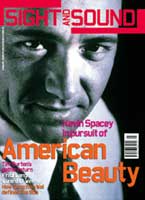Primary navigation

UK 1999
Reviewed by Claire Monk
Our synopses give away the plot in full, including surprise twists.
Kerala, India, the 50s. Lily MacIntosh, wife of BBC correspondent John MacIntosh, gives premature birth to their second child during one of John's many absences. Lily cannot produce milk, so 'Cotton' Mary, one of many Anglo-Indian (mixed-race) nurses at the hospital, hints at a solution. Mary starts secretly taking the ailing baby (named 'Baba') to her sister Blossom, a wheelchair-bound wet-nurse, for feeding. Identifying as British, both sisters yearn for the colonial past and are thrilled to have a white child to care for once more.
Credited with saving Baba's life, Mary joins the MacIntosh household as an ayah (nurse) and, with Lily depressed and withdrawn, works her way into a position of increasing power. She supplants Joseph, a loyal servant, and harbours delusions of replacing Lily as the lady of the house, unaware her niece Rosie has become John's lover. Blossom, still feeding Baba, becomes resentful at receiving no white recognition. Mary promises a visit from Lily and Blossom makes elaborate preparations, but the guest who arrives is Mary dressed in Lily's clothes. Furious, Blossom denounces Mary's delusions and tells her of Rosie and John's affair. Rosie tells John how his baby is being fed and, disgusted, he rejects her. Distraught, Mary taunts Lily about John's infidelity and is dismissed. With John also gone, Lily can breastfeed at last and returns to England with her children. Mary, half-mad, is cared for by Blossom and the other Anglo-Indians.
Cotton Mary continues the interest in cultural identity shown in director Ismail Merchant's previous film The Proprietor. Mercifully, Cotton Mary is an enormous improvement on its predecessor. It also marks an absorbing (although not uncontentious) return to India and that country's entangled cultural relations, the trademark setting and subject of the bulk of Merchant Ivory's films before the 80s. (Merchant is the producing half of the Merchant Ivory partnership with James Ivory.) Although doubtful directorial choices are still evident - such as the swelling score that swamps the narrative - Cotton Mary has strengths which outweigh such eccentricities. Most crucially, it has a scrupulously intelligent script by first-timer Alexandra Viets and a striking central performance from Madhur Jaffrey.
"You're not a white man - you're neither fish nor fowl," El Hadji, the anti-hero of Ousmane Sembéne's Xala (1974) was told by his astute mother-in-law in that classic satire on postcolonial identity crisis. Cotton Mary is essentially an extended essay on the same theme, but set in India in the 50s, a moment when (in the resonant words of one character), "Mr Gandhi has been and gone." Its subject is the complex and troubled identity of the mixed-race Anglo-Indian community, a minority whose status and self-image have been damagingly dependent on fluctuations in British colonial policy and attitudes over the centuries. Favoured in the early stages of colonisation, many Anglo-Indians identified so strongly with the British they regarded themselves as such, only to find themselves rejected as fears about racial purity and native uprisings began to surface.
The damaging psychic effects of this history are powerfully and minutely conveyed in the film via Jaffrey's Cotton Mary. She embodies a contradictory internalisation of 'English' values in which snobbery and terror of being 'mistaken' for an Indian conceal frustrated ambition and suppressed loathing, all pathologically mingled. An anachronism, Mary is forever bolstering a white-over-brown racial hierarchy which other characters are discarding. Her distorted perspective is conveyed via an ironic use of subjective shots and soundtrack: arriving as the MacIntoshes' live-in nanny, she sees herself being greeted by a butler at an English country house to the strains of 'God Save the Queen'. However, her self-delusion turns sinister as she gradually assumes Lily's identity as the white 'Madam'. In the film's climactic moment of cultural cross-dressing, she promenades around town in an outfit stolen from Lily with Lily's baby in the pram, dropping in for a coiffure at the English Club. But her 'true' cultural identity is unmasked when the pram starts to smell and the source is revealed as a tongue which Mary has bought from a street stall en route.
As these examples suggest, the humanist, 'quality' tradition of film-making to which Cotton Mary belongs places limitations on its strategies for dealing with its subject. While its makers clearly understand that the problematic Anglo-Indian identity represented by Mary has historical causes, the film can only show effects; in place of a collective problem of cultural identity, it explores an individual character. This approach risks inviting a reactionary reading by audiences. There is little to prevent us from responding to Mary as mad or evil rather than understanding her malaise as the product of a larger social problem. Nor does the film - structurally, a cuckoo-in-the-nest or nanny-from-hell narrative - prevent a snobbish, or even racist, reading of her behaviour.
However, Cotton Mary counteracts such reductiveness by offering a rich multiplicity of meanings. Structurally, it can be seen as Lily's story as much as Mary's. If the surface problem motivating (and resolved in) the narrative is Lily's inability to breastfeed, the underlying problem is that both women are trapped within a dying colonial, patriarchal system which they do not know how to reject. As Mary's mental state declines, a whole history of embedded racial, sexual and class fears and aspirations surface in her ramblings. The film ends eerily with her teaching a young girl the Lord's Prayer and instructing her: "Keep your mind on the job, or you'll never get out of here." The camera pans away to frame the Anglican church, the cornerstone of Anglo-Indian values in the film, but the music we hear is from a sitar - a parting shot which seems to apportion both blame for Mary's values and reject them.